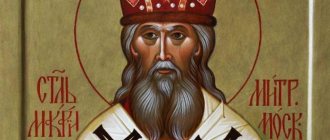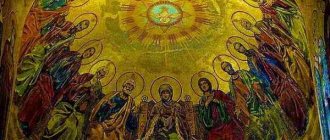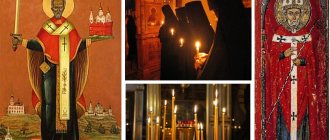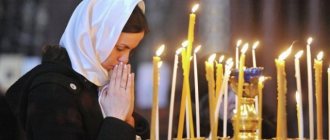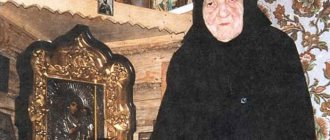According to statistics, the majority of people who died on their own were baptized Orthodox Christians. What should their friends and family do in such a situation? Is it possible to pray for murdered souls? The Church is quite strict in this regard - prayers for suicides and funeral services are not held, since the person independently chose death and committed a mortal sin.
Other articles about suicides:
- The attitude of the Orthodox Church towards suicides
- Prayer to the holy martyr Huar
But you can still pray for such children and relatives, but only at home. To do this, you can use the text by Lev Optinsky “On Suicides.”
The meaning of prayer for the dead
Is there an Orthodox prayer for a suicidal person? Why is it impossible to commemorate suicides in church and how to help their souls? To find out the answers to these questions, you need to understand the meaning of Orthodox prayer for the dead.
Christianity teaches that man consists of a perishable physical body and an immaterial immortal soul. During life, when these entities form one whole, we have free will and the ability to repent. But after the death of the body, the soul is separated from it and passes into the spiritual world, into Eternity. She is no longer able to change and influence her fate. If a person did not strive for God and did not work for his salvation, then in the afterlife his soul suffers at the mercy of dark forces.
Prayer for a suicidal person
However, the souls of the dead are helped by the love and compassion of living people. Orthodox Christians offer church and home prayer to God for their departed loved ones, and also perform good deeds for the repose of their souls. The merciful Lord does not leave unanswered a fervent prayer for the deceased and makes his fate after death easier. Saint John Chrysostom teaches:
“Offerings for the dead are not in vain, prayers are not in vain, alms are not in vain: the Holy Spirit established all this, wanting us to benefit through each other” (“Conversations”).
Life of Saint Leo of Optina
The Optina elder is revered for his wisdom and insight. During Leo's life, numerous cases of miracles were recorded. Especially often he healed mentally unbalanced people from mental wounds.
Lev Optinsky was born to tradesman Danila Nagolkin and his wife Ulita. According to some sources, the year of his birth is 1772, according to others - 1768. From the age of 10, he served as a clerk for the merchant Sokolnikov. During one of his trips, Lev survived a wolf attack. The beast jumped inside the cart and, out of hunger, tore a piece of meat from the calf. The lion was able to strangle the beast - this allowed him to stay alive. The lameness remained with the reverend until the end of his life.
When he turned 29 years old, he became a novice at Optina Pustyn. Leo’s path as a monk passed under the guidance of the disciples of St. Paisius Velichkovsky. In 1801, Leo was tonsured as monk Leonidas. A few months later, Leonid was ordained a hierodeacon and then a hieromonk. A year later, the brothers elected Leonid as Rector of the Beloberezh Hermitage.
A year later, Leonid resigned as abbot and was tonsured with the name Leo. In the spring of 1811, the monk, together with Fyodor and Cleopas, settled on Valaam. They lived there for 6 years.
Then Leo arrived in Optina Pustyn. There he became the founder of the eldership. Among the disciples of the Optina Elder were Macarius, Ambrose, and Ignatius.
Since 1835, the Monk Leo was the confessor of the monastery. In the fall of 1841, the reverend felt ill. He stopped eating and began taking communion daily. After some time he died.
Even during his lifetime, the Venerable Leo possessed various spiritual gifts, then the gift of healing was added to them. Everyone who could flock to the elder. He healed those possessed by the power of prayer alone. After talking with the monk, everyone felt peace. The elder influenced people and helped them repent of all their sins. Leo Optina was canonized in 1996.
Why is church prayer for a person who committed suicide impossible?
Church commemoration of the dead (funeral service, requiem service, commemoration at the liturgy, etc.) is performed in relation to baptized Orthodox Christians. Their souls are living members of the Holy Church. However, such prayer for a suicide in Orthodoxy is prohibited by church canons (14th canon of Timothy of Alexandria). This applies even to those suicides who were baptized.
Suicides deliberately cut themselves off from communion with the Lord.
“Life is a gift from God. But by ending it with suicide, such people are like throwing this gift into the face of God.”
- says the Monk Paisiy Svyatogorets. Archbishop John Shakhovskoy calls the unauthorized taking of one’s life “the murder of one’s love for God.” Suicide is a mortal sin that deprives a person of the opportunity to repent. This is the transfer of temporary, earthly torment into Eternity. Saint Theophan the Recluse teaches:
“The Church does not pray for suicides, for they die in unresolved mortal sin - not purified by repentance” (Collected Works).
A true member of the Church is a Christian not only during life, but also at the moment of death. The death of a suicide cannot be called Christian. Such a person “amputated” himself from the living body of the Holy Church. Bishop Jonah (Cherepanov) notes:
“During the funeral service, we pray: “With the saints, rest your servant.” But it is difficult to call a servant of God a person who has renounced the will of God, much less boldly to ask the Lord to rest him with the saints.”
The Church makes an exception only for those suicides who committed suicide in a state of passion or due to mental illness. Only the ruling bishop can give a blessing for the church commemoration of such a person. To do this, the relatives of the deceased must provide the diocesan administration with the relevant medical certificates and documents.
conclusions
The Church prohibits many things. In the event that your loved one said goodbye to life, it is necessary to carry it out properly. Therefore, they use prayers for suicides, which can be read at home.
When reading them, you should adhere to a number of rules and sincerely ask for forgiveness for what you have done. You can help someone close to you by giving the prayer due attention and time, without shortening the text. It is worth concentrating, clearing your thoughts of unnecessary worries and completely surrendering to spiritual communication.
Choose life with Christ!
“For God so loved the world that he gave his only begotten Son, that whoever believes in him should not perish but have eternal life” (John 3:16) “Choose
life, that you and your descendants may live to love the Lord your God, He listened to His voice and clung to Him; for this is your life and the length of your days...” (Deut. 30:19-20)
How to pray for the soul of a suicide?
So, church commemoration of suicides becomes difficult, but their souls need our private, home prayer. Therefore, the Church blesses the cell (home) commemoration of suicides, calling for hope in the boundless mercy of the Lord. The Monk Leonid of Optina consoled his student, whose father had committed suicide:
“God loved and loves him incomparably more than you. This means that you can leave the eternal fate of your parent to the goodness and mercy of God. Pray to the All-Good Creator, thereby fulfilling the duty of love and filial duties.”
Let us also quote the words of St. Paisius the Holy Mountain:
“We must pray a lot for those who commit suicide, so that the Good God will do something for them. After all, we don’t know why they committed suicide, nor do we know what state they were in at the last moment of their lives. Perhaps at the hour when their soul left their body, they repented, asked God for forgiveness, and their repentance was accepted.”
How to pray for a suicidal person after death? The shortest version of a home funeral petition is the words: “Rest, O Lord, the soul of your deceased servant (name).” There is a special prayer for a suicidal person, which was compiled by the Monk Leo of Optina. They also often pray to the early Christian martyr Uar about suicides. He is traditionally revered as the intercessor of those who are not commemorated by the Church. Let us quote the words of the New Martyr Bishop Athanasius (Sakharov) about humble home prayer for those whose church commemoration is impossible:
“This prayer will be more valuable in the eyes of God and more gratifying for the departed than one performed in church, but with violation and neglect of Church statutes.”
In Orthodoxy there is a special “Rite of prayerful consolation of relatives who have died without permission.” It is intended to ease the grief of relatives and may be useful to those who ask whether it is possible to pray for those who committed suicide.
Prayer for resentment and anger of the Optina elders
In the modern world, people often face unpleasant situations: envy, hatred, resentment and other problems that leave a residue on the soul. Numerous grievances and anger have a poisonous effect on a person, worsening his health and life in general. There is a special prayer for the peace of mind of the Optina elders, which must be read if bad thoughts arise in the soul. You can turn to the Almighty at any time when the need arises.
“Lord Jesus Christ, drive away from me all inappropriate thoughts! Have mercy on me, Lord, for I am weak... For You are my God, support my mind, so that unclean thoughts do not overcome it, but in You, my Creator, (he) delights, for Your Name is great for those who love You.”
What else should relatives of a suicide do?
The soul of a suicide can be helped not only by prayer, but also by doing good deeds for his repose. For example, by distributing alms or food. Priest Roman Prisypkin advises:
“When giving alms, ask those you help to also remember the name of the suicided person in private prayer.”
The relatives of the suicide victim should remember that their personal pious life is also important: the desire to fulfill God’s Commandments, regular attendance at divine services and participation in the Church Sacraments. The Lord will ease the fate of the soul of the deceased if he sees the diligent spiritual efforts of his loved ones.
The most significant church rituals are called sacraments, in which the Lord Himself invisibly participates. The main Church Sacraments for baptized Orthodox Christians are Confession and Eucharist (Communion). Confession is a sincere repentance before God of one’s sins, performed in the presence of a witness-priest. Genuine repentance implies an active change in one’s life and firm opposition to sin. In the Sacrament of Confession, the Lord forgives a person and gives him spiritual strength to fight passions. The Holy Venerable Paisius the Svyatogorets instructs:
“In the Sacrament of Confession, the Grace of God acts and a person is freed from sin... A heavenly door opens to a repentant sinner, the Grace of God generously overshadows him... Having removed themselves from the Sacrament of Confession, people suffocate in thoughts and passions” (“Words”, volume 3).
The Sacrament of Communion consists of a saving communion with Christ through the partaking of His Blood and Body under the guise of bread and wine:
“He who eats My flesh and drinks My blood abides in Me, and I in him” (John 6:56).
This is not a symbolic, but a real union with the Lord, sanctifying and transforming a person. Through Communion, the Almighty restores fallen human nature, heals it from the deadly ulcer of sin. Metropolitan Hilarion (Alfeev) notes:
“As Christ permeates bread and wine with Himself, filling them with His Divinity, so He enters into man, filling his flesh and soul with His life-giving presence and Divine energy.”
Private prayer for a suicide victim
Prayer of St. Leo of Optina for cell reading
Seek, O Lord, the lost soul of Thy servant (name): if it is possible, have mercy. Your destinies are unsearchable. Do not make this my prayer a sin, but Thy holy will be done.
Troparion to the Martyr Uar of Egypt, tone 4
Through the army of the saints, the passion-bearer of the lawfully suffering, / in vain, you showed your courageous strength. / And you rushed to the passion of your will, / and died lustfully for Christ, / Who accepted honor for you Years of your suffering, Ware, // pray for our souls to be saved.
Translation: Seeing the army of holy passion-bearers suffering under the law, you courageously showed your strength and voluntarily rushed to suffer, and wished to die for Christ, having accepted the reward of the victory of your martyrdom, Uar, pray for the salvation of our souls.
Kontakion to the Martyr Uar of Egypt, tone 4
Following Christ, martyr Ware,/ having drunk the cup,/ and wearing a crown of torment,/ and rejoicing with the Angels // pray unceasingly for our souls.
Translation: Having followed Christ, martyr Uar, having drunk His cup, you were crowned with the crown of martyrdom and rejoice with the Angels, pray unceasingly for our souls.
Prayer to the martyr Uar of Egypt
Oh, holy martyr Ouare! We kindle with zeal for the Lord Christ, you confessed the Heavenly King before the tormentor, and you suffered zealously for Him, and now the Church honors you as glorified by the Lord Christ with the glory of Heaven. Accept our petition and with your prayers free us from eternal torment. Amen.
Read us conveniently on social networks:
Tags: how to pray for a suicide after death, is it possible to pray for a suicide, prayer for a suicide, prayer for suicide in Orthodoxy
They pray to Saint War for the unbaptized: truth or myth?
Recently, the prayer to the martyr Uar for the unbaptized and even suicides has also gained particular popularity.
Its adherents believe that supposedly Saint Uar, to whom the pious Christian Cleopatra zealously prayed for her dead pagan relatives, begged the Lord for the salvation of the departed. But where is the truth and where is fiction? Let's try to figure it out.
Martyr Uar is by no means a fictional character. He was a warrior from the time of Emperor Maximin - one of the famous persecutors of Christianity - and a secret Christian. Therefore, at night he visited the imprisoned Christians. One day he visited seven teachers and turned to them with a request to pray for him, since he was not yet so firm in faith as to confess Christ before his martyrdom.
Shortly after this, one of the teachers fell ill and died. Then the martyr Uar decided to “replace” him and suffer with the rest. The saint died from severe torture, but never renounced God.
One pious widow, seeing his faith and suffering, decided to hide the relics of the martyr in her home. She and her son repeatedly prayed to the saint.
When the persecution of Christians stopped, she decided to return from Egypt to Palestine. In order to take the relics of the saint with her, she said that these were the remains of her husband, who was a military leader. So she managed to transport the holy relics and place them in the same place where the tomb of her ancestors was.
Together with her son, Cleopatra prayed every day at the tomb. Other Christians followed her. Through the prayers of the martyr Uar, they received healing and relief from illnesses.
It is necessary to build a temple for the saint - the widow conceived and began to implement her plan. Her son John helped her in everything. Together with the bishops and a meeting of Christians, they transferred the remains of the righteous man to a new tomb, near which Cleopatra fervently prayed for herself and her son. She dreamed of the boy becoming a warrior. But she asked the martyr Uar to help her son choose a path in life.
After this, John, who was already 17, died suddenly of a fever.
The woman was in complete despair and even began to grumble against the martyr - how could he allow this to happen? But the saint appeared to her and said that John really had the better path. If on earth he had to become a warrior and serve the earthly king, then in the Kingdom of God he serves the Heavenly King. The happy son asked his mother not to suffer, because he, together with the Angels, served the Lord.
After this, Cleopatra buried her son next to the saint, distributed her property and prayed all her time in the built temple, near the relics of the martyr Huar.
As we see, in the life of the saint there is not a single word that the widow prayed for her pagan relatives. She prayed only for her son. But he was by no means a pagan. If John, together with his mother, built a temple for the saint and prayed at the relics, then could he be an unbeliever?
Unfortunately, the beautiful story that Saint Uar begged Cleopatra’s relatives, who were pagans and during their lifetime chose the path of renunciation of God, remains just a story that inspires prayer for the unbaptized.



